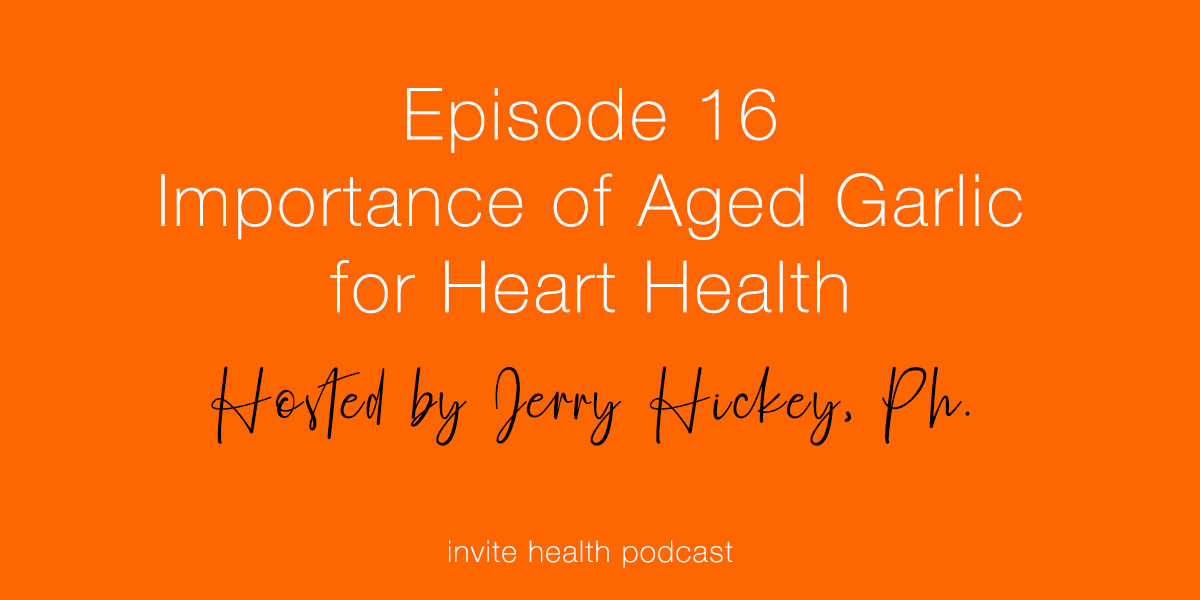Importance of Aged Garlic for Heart Health – Invite Health Podcast, Episode 16

Invite Health Podcast, Episode hosted by Jerry Hickey. Ph
Subscribe Today!
Heart disease is extremely dangerous. When most people think of heart disease, they are referring to the clogging of arteries in the heart by cholesterol which leads to strokes and heart attacks. But many factors contribute to heart disease and Aged Garlic has been proven to lower many of these other contributors substantially.†
Heart Concerns
Coronary artery disease occurs when the arteries within the heart muscle become stiffened and narrowed. This is a result of plaque build up which is mostly made out of LDL-cholesterol. This is very dangerous because the arteries inside the heart are much narrower than other arteries to begin with and this narrowing is a major risk for stroke and heart attack.
In studies of risks that contribute to developing heart disease such as elevated LDL-cholesterol, low-HDL the good cholesterol, high blood pressure, or elevated triglycerides, garlic leads to improvements but Aged Garlic consistently offers better results than other forms of garlic.
What is Aged Garlic?
Garlic belongs to the Allium family and is closely related to the onion, scallion and shallot. It has been used all over the world in many foods and added as a flavor for cooking. But traditionally garlic has been used for a variety of medicinal reasons especially in Ancient Egypt to promote a healthy immune system, heart function, borderline blood pressure, borderline LDL-cholesterol, and circulation.
When garlic is aged, some of its health-preserving constituents are augmented, making it more powerful for the immune system and in the support of health health without the odor, stomach upset, or gassiness. The aging process converts unstable “allicin” to even more powerful properties. Aged garlic is odorless and richer in health-promoting compounds than fresh garlic or other forms of garlic preparations, more effective in boosting immunity, and more beneficial in protecting the body than other garlic forms.
So how do you make Aged Garlic? You start off with high quality, non-GMO garlic that has not been sprayed; you wash it to clean off any dirt, slice it thin and cover it with water for at least 18 months. Then you dry it, check it for purity, make it into a powder, and check it again.
Evidence of Aged Garlic At Work
In terms of blood fats, one breakthrough study performed by UCLA (University of California, Los Angeles), research found that adding Aged Garlic to Statins decreased plaque build up an additional 50%.
A separate study published in the journal Atherosclerosis studied the benefit of garlic supplementation over four years in men and women. Garlic supplementation actually reversed plaque buildup in their arteries by 4.4 % in men and by 4.6% in women. Meanwhile, study participants on placebo had an additional 15.6% increase in plaque buildup. All subjects had advanced plaque buildup in their arteries and other issues such as high blood pressure, obesity, or diabetes.
In a review of eight separate meta-analyses (a group of similar studies that can add to results by large numbers of participants, research, etc..) by researchers at the University of Saskatchewan and at Harbor-UCLA Medical Center, Garlic lowered total cholesterol up to 29.8 points. In their review of 4 additional meta-analyses and two original studies the researchers found that in people with hypertension, Garlic (especially Aged Garlic) reduced SBP up to 16 points. It also reduced DBP by up to 9 points. The review also showed that Aged Garlic lowered hs-CRP.
Many things are shown to be cardio-protective; a healthy diet including lots of fresh fruits and vegetables, exercising, and cutting back on sugar and salt. But Aged Garlic demands respect for its clinically proven ability to substantially lower the risk factors that contribute to heart disease.
Thank you for tuning in to the Invite Health Podcast. You can find all of our episodes for free wherever you listen to podcasts or by visiting www.invitehealth.com/podcast. Make sure you subscribe and leave us a review! Follow us on Facebook, Twitter and Instagram at Invite Health today. We’ll see you next time on another episode of the Invite Health Podcast.
